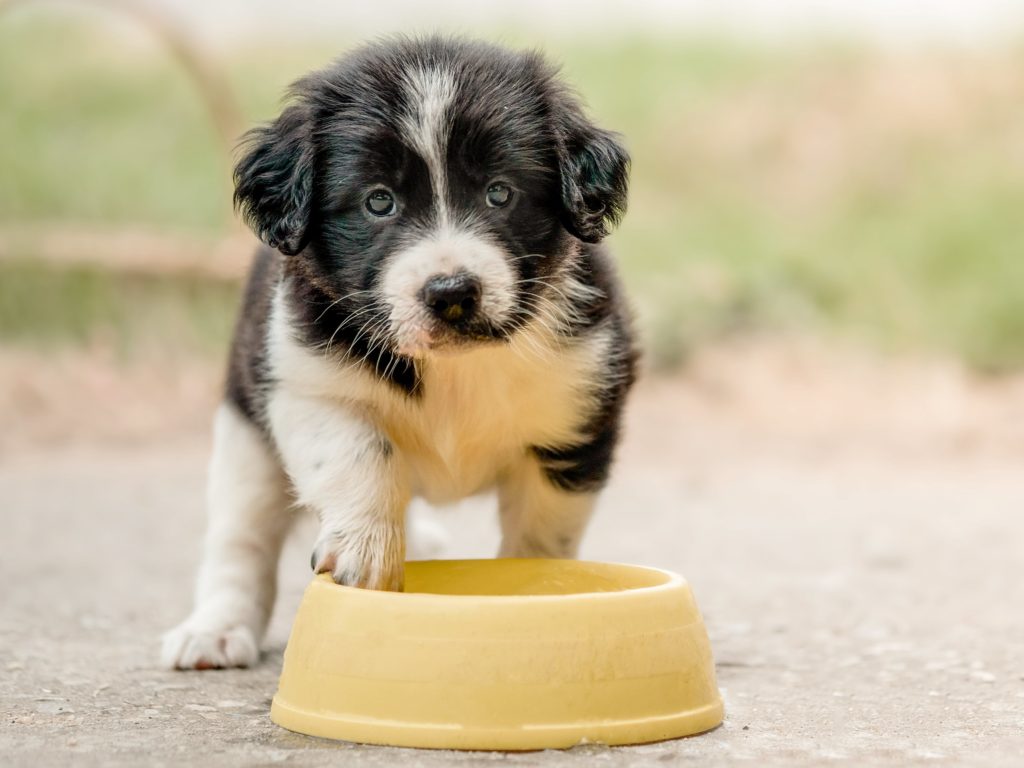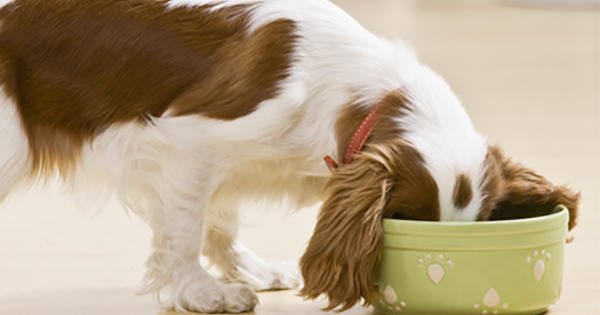How much to feed 8 week old puppy? The diet of your puppy will impact his growth, development, and behavior.
High quality puppy food will make your puppy live a long and healthy life. These are common questions for puppy owners.
How much food should you feed your puppy? Is it time to stop giving your puppy food?
Our comprehensive guide to puppy feeding will answer all of your questions. Our experts are available to answer your questions and offer advice to help ensure your puppy’s success.
Contents
For Their Health, Puppy Food is Essential
Puppy growth has become more difficult than ever. Puppy food must be balanced. Puppy food can often contain some nutrients from mother’s milk like the Omega Fatty Acid DHA.

You should ensure that your puppy food has the appropriate labeling or that it contains the words “for all stages of life”.
How to Feed a Puppy
There are many factors to consider when feeding puppies. The type of food your puppy eats, their nutritional status, and the breed will all affect how they are fed. These are the facts.
How Much To Feed a Puppy
| Age | Frequency | Portions |
|---|---|---|
| 8-12 Weeks | 3-4x/day | Small Portion |
| 4-5 Months | 3x/day | Puppy Food |
| 6-8 Months | 2x/day | Puppy Food |
| 9-11 Months | 2x/day | Adult Food |
| 1-2 Year | 2x/day | Adult Food |
| 2 Year + | 2x/day | Adult Food |
Puppy Nutrition
Puppy food is essential for their development. To ensure their development and health, puppy food must be balanced.
Balanced puppy food will ensure healthy puppies. High-quality protein formulas are essential for their growth. Dogs can be energetic and playful if they have access to fat and carbohydrates for energy. Calcium is vital for the development of teeth and bones. DHA is good for vision and brain health.
Feeding Puppies Large And Small
Puppy food isn’t just for dogs, it can also be beneficial to certain breeds.
Large-breed puppies may benefit from a large breed-specific puppy formula. There are also small breed-specific formulas. Food should be balanced for all breeds.
Formulas can differ between small and large breeds. Larger dogs are more susceptible to developing joint problems, so puppy foods for large breeds should provide adequate nutrients to support their healthy growth and development.
For smaller breeds, it might be more convenient to use smaller kibble for chewing their food. This allows them to get all the nutrients they need.
Karina Carbo Johnson MS, Purina Nutritionist, says small breed-specific dog food is crucial due to its faster metabolism. This makes it possible for both adults and puppies to enjoy a healthy lifestyle.
Wet And Dry Puppy Food
Although dry dog food is very popular, it’s not the only option. As you walk down the aisles, you may see both moist and dry dog food.
It can be hard to decide the right food for your puppy. Your puppy can be fed either dry or wet food as long as it is balanced and complete.
You and your puppy may have different drying preferences. Your puppy can be fed a combination of both.
Allison Millican, Ph.D., Purina Nutritionist, says that dogs should be fed a mixture of wet and dry food to meet their energy needs. The nutritional information on each package will help you determine how much dry food can be replaced with wet. This information will help you calculate the amount of each product required to satisfy your dog’s nutritional requirements.

Millican estimates that a 13-ounce can of wet puppy food (or 13-ounces) has 475 kilocalories. This could replace approximately one cup of dry puppy food, which contains a similar number of kilocalories. One cup of dry dog food could be replaced with a 13-ounce container wet food.
Millican says that puppies can grow at different rates, and their body’s condition can change rapidly. Millican states, “It’s important to monitor your puppy’s health. Adjust your puppy’s calorie intake if necessary to avoid underfeeding or overfeeding.”
Brand websites and your veterinarian are excellent resources. They can help you design a feeding plan tailored to your dog’s needs.
Puppy Feeding Chart Weight
| The Ideal Weight for a Dog | 12 Weeks of Weaning | 4-5 Months | 6-8 Months | 9-11 Months | 1-2 years |
|---|---|---|---|---|---|
| 3-12 lb | 1/2-1 Cup | 2/3-1/3 cups | 1/2-1 1/2 cups | Adult portion | Adult portion |
| 13-20 lbs | 1/2-1/4 cups | 1-1/8-2 cups | 3/4-1/3 cups | 1-1 1/2 cups | Adult Portion |
| 21-50 Pounds | 1/2-1 1/2 cups | 1 1/2-2 3/4 cups | 1 1/2-2/3 cups | 2-3 cups | 2 to 4 1/4 cups |
| 51 to 75 lbs | 5/8-2/3 cups | 1 1/2 to 4 cups | 1 1/2-3 3/4 cups | 2 1/2-4 3/4 cups | 2 1/2 - 6 1/4 cups |
| 76-100 lbs | 2/3 cups | 2 7/8-3 3/4 cups | 2 7/8-6 1/3 cups | 3 7/8-7 cups | 5/5/8-11 cups |
| 101+ Pounds | 2 1/3 cups + 1/3 cup per 10 lb more than 100 | 1/3 cup + 3/34 cups for every 10 lbs more than 100 | 6 1/3 cups + 1/3 Cup for every 10 lbs more than 100 | 7 cups + 1/3 cup per 10 lbs more than 100 | 11 cups + 1/3 cup per 10 lbs more than 100 |
How Many Puppy Foods Should I Give?
Now that you are familiar with how much your puppy should be fed, you may wonder, “How often should a puppy be fed?” It is important to establish a routine so your puppy knows when to expect food.
- From 4-12 weeks old: Young puppies require three to four meals per day to meet their nutritional requirements. According to the chart or the feeding guide provided with their food, you should divide this number by three or more, and feed them throughout the day.
- 3-12 months: As your dog gets older, you may reduce the amount of food that they eat to two meals per day. They will be less energetic and require less food during the day.
- 12+ Months: Most adult dogs eat two meals per day. It is best to divide their food requirements by 2.
Puppy Feeding Schedule
The typical puppy feeding time is 7 am, noon, or 5 pm. You can change your puppy’s eating times if you have more than three feeds. Keep the last meal at 5 o’clock. This will allow your dog to fully digest the food before he goes to bed.

To avoid overeating, stick to the schedule
It can be tempting for your dog to eat whatever you leave out, especially if it is not something you do regularly. Free-choice feeding can encourage overeating and lead to your dog gaining too much weight. To ensure your puppy gets the right amount of food for his age and size, it is important to control portion sizes.
What can puppies eat?
Here is a quick timeline of puppy nutrition during the first few months.
- 0-3 weeks: Puppies should spend as much time with their mother and nurse, as they wish. Mother’s milk contains all the nutrients needed to nourish and protect your puppy from disease. You don’t have to worry about feeding puppies enough because they are provided with nutrition by their mother.
- 3-4 weeks: Puppy will start to develop teeth and wean off their mother’s milk. A puppy caregiver can mix a 50/50 portion of canned puppy food with a milk substitute in a flat saucer. Then, slowly reduce the milk replacer until they are only eating puppy eat. It is okay if puppies don’t enjoy the new food. It might take some time for the puppy to get used to the new food. The transition can be made easier by gently rubbing the mixture on the puppy’s nose, mouth, and throat.
- 4-6 Weeks. By this point, puppies should have been fully transitioned into puppy food.
- 6-12 months: Gradually switch your puppy to adult food. Smaller breeds can change between 7-9 months old and larger breeds at 12 months. To make sure your puppy is getting the right nutrients, it’s a good idea to give him puppy’s food for longer than he needs.
Tips How to Feed a Puppy
After you have determined the daily food amount for your puppy, you can create a puppy feed schedule. Divide the daily food requirement of your puppy into three to four smaller meals. These smaller amounts should be given to your puppy at regular times throughout the day.
It is easy to give your puppy a meal three times a day: breakfast, lunch, and dinner.
Make sure to feed him before he goes to bed so that he can digest the food. This will help to prevent any accidents. It is important to be consistent. Dogs will learn to be consistent by being fed at the same time each day.
When Is It Time To Stop Feeding Your Puppy Food?
Stop feeding puppy food, and give him a balanced and complete adult dog food.
The breed size of the puppy will dictate his transition, as well as the amount of food he needs. It may take longer for larger breeds to reach full maturity. Therefore, a puppy may require puppy food for as long as two years.

However, you can expect to transition to adult dog food within one to two years.
Talk to your veterinarian about the best time to switch. They can also give you tips for making it easy on your dog.
What About Puppy Treats!
You can’t resist giving your dog tasty treats. Treats are a great training tool.
It is important to remember the 90/10 rule, regardless of whether you are rewarding your dog for good behavior or simply wanting to show your love. His complete and balanced puppy food should make up 90 percent of his daily calories. Treats can make up the remaining 10%.
The 90/10 rule can be used to prevent weight gain and other problems later in life.
It’s hard to resist those puppy eyes, but you are building a dog and training it. Do not give in to his begging for human food. You’re not only making it more difficult for him to learn to eat human food, but also rewarding his undesirable behavior, which can be very hard to break down later.
Referring to the puppy feeding chart and adhering to the 90/10 rule will ensure your dog has a happy, healthy, and long-lasting life. Browse all of our puppy food options and find the perfect recipe for your pup.
F.A.Q.
How much dry food should I feed my puppy?
| Age | Frequency | Portions |
|---|---|---|
| 8-12 Weeks | 3-4x/day | Small Portion |
| 4-5 Months | 3x/day | Puppy Food |
| 6-8 Months | 2x/day | Puppy Food |
| 9-11 Months | 2x/day | Adult Food |
| 1-2 Year | 2x/day | Adult Food |
| 2 Year + | 2x/day | Adult Food |
Is my 8 week old puppy eating enough?
Puppies often need one to two days to adjust to their new environment. For puppies that are small or very young, it is even more important to eat regularly. Talk to your vet if your puppy is between 8-12 weeks old and hasn’t had a meal in the last day and is acting strangely.
What is a good feeding schedule for an 8 week old puppy?
Proper nutrition is essential for your puppy’s growth and development. You should provide high-quality puppy food that is labeled for growth. The majority of puppies aged 8-12 weeks should be fed at least three times per day. This should be spaced fairly evenly. In very small breeds, this regularity helps to prevent blood sugar drops.
